issues for e-commerce and internet marketing students

| SEARCH
ENGINE
issues for e-commerce and internet marketing students |
 |
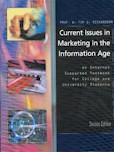 |
this unit is
in the text
"Current Issues in Marketing in the Information Age, 2nd. Edition" on page 107 - 122 |
 |
This web page has audio clips - just click on the icon (like the one to the left) and you can hear Prof. Richardson's voice adding additional information to topics on the page. |  |
turn on your speakers to hear audio clips |
| . | This page
used in the following courses taught by Prof. Richardson
.
|
| The
Basic .Search
Engines - with accompanying links by
2013
|
|
| LEARNING
OBJECTIVES |
After completing
reading this unit, and listening to the lecture in class, student will
have information about:
o new
features in Google and Yahoo that make Search Engines more useful
WTGR |
 |
This site explains
how the different search engines work and how to get yourself higher up
on the list
-covers search engine registration and submission tips, such as using meta tags, improving placement and how to submit URLs. |
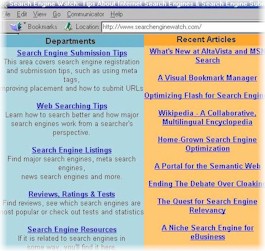 |
The screen capture to the
left was taken in 2003 of the famous www.searchenginewatch.com
site. It is worthwhile looking at the material on this site since ranking
in a Search Engine is increasingly more important as the content on the
Internet gets more and more crowded.
In 2015 this site is still valuable as a resource for people who want to be search engine specialists. |
| KEY
POINTS |
There is quite
a bit of information on the Internet, about using Search Engines - and
most Search Engines have information saying how great they are - but sometimes
it is difficult to find some simple words saying what Search Engines are
in easy to understand jargon. The best description I found is,
"A search engine is simply a Web site designed to help you find information on the Internet by searching a database of Web pages for "keywords" that describe what you're looking for" was at www.onenw.org/bin/page.cfm?pageid=53 |
| Search
Engine Basics
|
Search
engines are generally free to the web-surfing public, although you may
have to endure some advertising when you use them.
Search engines are created by a combination of sophisticated software tools (often called "robots" or "spiders") that do nothing but download and index pages from the Web, and real live human beings who help impose order on the resulting chaos. There are many search engines available, but all search engines are not created equal. Each builds a index of Web pages in a different way, catalogs different pieces of information about each page, and provides a different user interface to allow you to search its database. To maximize your chances of finding the information you need quickly and efficiently, its important to pick the right search engine for the job." |
| KEY
POINTS |
Basic Issues
|
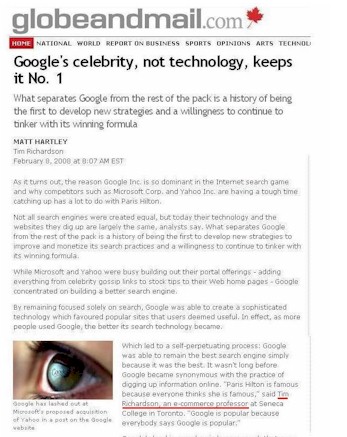 |
During
the 2nd week of February 2008, Richardson was interviewed by Matt Hartley
of the Globe & Mail about Search Engine Google for an article
titled "Google's celebrity, not technology, keeps it No. 1". Richardson
explained why Google ranks as the No. 1 Search Engine and also provided
some tips as to how websites are ranked. witiger.com/ecommerce/articleGoogle2008Feb8th.jpg
Richardson told Hartley that "the reason Google Inc. is so dominant in the Internet search game and why competitors such as Microsoft Corp. and Yahoo Inc. are having a tough time catching up has a lot to do with Paris Hilton" !!!! Richardson explained "While Microsoft and Yahoo were busy building out their portal offerings - adding everything from celebrity gossip links to stock tips to their Web home pages - Google concentrated on building a better search engine. By remaining focused solely on search, Google was able to create a sophisticated technology which favoured popular sites that users deemed useful. In effect, as more people used Google, the better its search technology became. |
| Search
Engine mergers
and alliances
|
"...Google had, claiming with Microsoft's past, if Yahoo! accepted it would somehow catapult Microsoft into an Internet monopoly. I find that claim to be very hypocritical seeing that even if Microsoft acquired Yahoo!, Google would still have a huge lead in the Internet search market (75% of the online search and advertising market, compared to a combined 20% total for Microsoft and Yahoo!). Google should be the last company speaking out and accusing others about Internet monopolies. Google also claimed it would "kill the underlying principles of the Internet: openness and innovation". I would argue the opposite, .." 2015 update
|
| Search
Engine Basics 2004
|
2. Enter an airline name or code and a flight number (e.g.: UA 44) and you'll get two links to flight information, from Travelocity and fboweb.com. By Chris Sherman, Associate Editor at searchenginewatch.com says "this feature works well... It only appears to work for major airlines, however" Cherman says "Yahoo seems to do a better job of tracking more airlines than Google (it found information on the Frontier and ATA flights that Google missed), but it accepts fewer variations on airline names or codes. |
| Search
Engine Basics 2004 UPDATE
|
3. Chris Sherman, Associate Editor at searchenginewatch.com says "Want information about a specific product? Enter its Universal Product Code (UPC), the number on the bottom of a bar code displayed on product packaging into the Google search box (e.g.: 074101420241). If the product can be found, results include a link to the UPC Database for more information. Witiger tried this with the
UPC code from his new mini-digital camera
|
| Search
Engine Basics 2004 UPDATE |
4. You can now type in Area Code Information and get maps etc. |
| Search
Engine Basics 2005 UPDATE
|
5.
Associated Press ran a story in first week in October 2005 about University of Toronto backing Yahoo's efforts to create an online library. Michael Liedtke, who wrote the piece for AP, explained that Yahoo announced plans to provide digital versions of books, academic papers, video and audio material which is voluntarily submitted by publishers and authors. The structure within which this will happen is called the Open Content Alliance www.opencontentalliance.organd University of Toronto is one of the partners backing this. The Search Engine "business" is becoming highly competitive with Google having outpaced Yahoo! in recent years but Yahoo! is fighting back hard with this new strategy and is trying to gain some good public relations in the face of the bad public relations that Google has been getting. Google has a one year head start on scanning and indexing books but they have received bad press because Google said they would do this with, or without the author's consent.
|
| Search
Engine Issues with aerial imagery |
6. How good are these aerial photos? well, it depends. Some people are pretty impressed, but it depends on whether the region of the world you are looking at is updasted regularly, or not Looking at the one for Seneca College, (below) and the one for UTSC (below) , you can see both are a couple of years out of date because the buildings that were erected in 2003 are not visible - even though Google shows the image in 2007. This date discrepancy suggests Google might be buying satellite imagery that is a few years old. This has implications for people trying to apply such images in military or intelligence circumstances. |
 |
Google's aerial photo of the University of Toronto Scarborough Campus looks like it was dated in 2003. It doesn't show the completed construction on the Management building in 2004 or the Academic Resource Center in late 2003 |
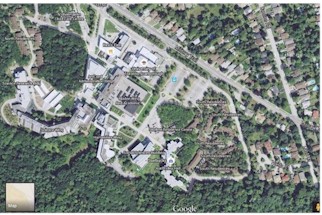 |
Google's aerial photo of the University of Toronto Scarborough Campus available in 2015 shows he new (old) Management building but the area for the Instructional Centre still shows the old parking lot from 2010 |
 |
Google's aerial photo of Seneca College (as shown on Google in Sept 2005) doesn't show the completed C wing which was done in 2004. It appears to be at least a year and a half or 2 years out of date. |
| Search
Engine Issues with aerial imagery |
6. In 2005 Google launched some controversial features, such as google map, which allowed viewers to see aerial photographs of every part of the world. This was interesting for many people, but also troublesome for others, particularly security minded people who were worried that such images could be used by terrorists. In 2005 witiger.com showed students how it was possible to view aerial photographs of Buckingham Palace. |
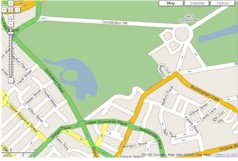 |
When
people complain about Google revealing information that is vulnerable,
can any examples be provided? Yes,
- to the left is Google's map of downtown London, England, which simply shows a green blank spot to the west of St. James |
 |
On the aerial photo view, you can clearly see Buckingham Palace, the home of the Queen of England and the head of state for Canada. |
| Search
Engine Issues with aerial imagery 2007
|
6.
Canada's CBC reported Feb 5th, 2007 "India wants Google Earth maps blurred" CBC said "Google is in talks with the Indian government over high-resolution images of the country shown on its Google Earth service. Indian defence officials raised security concerns last year with the internet search engine about the satellite imaging program's level of detail at sensitive locations." The Times of Indiasaid Sunday the government is asking for images of sensitive locations to have a resolution no greater than 25 to 50 metres per pixel. The base resolution of Google Earth is 15 metres per pixel, while some cities in North America have resolutions of less than a metre per pixel. The CBC explained "It's not the first time a government has asked Google to blur images because of security concerns. Australia, Russia, South Korea and Thailand are all reportedly demanding the company blur sensitive images." |
| Search
Engine Basics 2006 UPDATE |
7.
|
| Search
Engine Basics 2007 Videos |
8. http://video.google.ca/ One of the kewl things that Google has done is allow you to search for videos on the web, whether they be .mpgs or .avi etc. - this was launched in 2007, which has been eclipsed by searches within YouTube - which Google owns |
| Search
Engine Basics 2008 Videos |
9. Street View images as part of Google Maps http://books.google.com/help/maps/streetview/ provided by Seneca student Katrina in MRK 619 in Feb 2008 Developed by Calgary-based
Immersive Media www.immersivemedia.com
|
| Search
Engines the
|
.
The CRTC - Canadian Radio-television Telecommunications Commission Trichur explains that the CRTC released a report that dealing with issues due to the large volume of broadcast media (video and audio programs) that have been posted on the Web in recent years (2006, 2007 and 2008) Basically, the bottom line is the Canadian government is worried about the thousands of people who take small video clips of stuff and put it in YouTube. In typical Canadian fashion the government is worried about promoting "Canadian content" and also what happens if people take clips of Canadian shows and put them on the web, without paying royalties etc. The journalist who wrote the story, Rita Trichur, said "Critics questioned the CRTC's motives for reopening the new media file after nearly a decade of taking a hands-off approach." Trichur added '"It's typical Canadian government – peace, order and good government – other people are doing something so let's try to control it because if we don't, oh gosh, they may try to do something interesting," said Tim Richardson, an electronic-commerce and technology expert at the University of Toronto. He [Richardson] added that any effort to regulate the Web is likely to be stymied by practical considerations, including the role search engine rankings play in determining where people surf online.' |
Self
Googling

|
"...many of us in the Internet generation have left a digital trail on the World Wide Web. There's a good chance that a random smattering of your personal information is dangling out there for anyone to peruse..." "This generation wants to
know everything about everything ..." says Tim Richardson, professor of
Internet studies and e-Commerce at the University of Toronto and Seneca
College. "And people don't realize that sometimes their postings on message
boards or in chat rooms can last four or five years.
How can we clear our good
names?
"If you wanted a page to not be found, all you have to do is create a bunch of newer pages that say something positive, or post them on a message board ... and the search engines are going to return the freshest pages at the top," says Richardson. "The unwanted pages get bumped to the back of the list." permission to quote given by Joanne MacDonald, TORSTAR Syndicate Sales, in an email 2004 Dec 09 |
|
advanced technologies revealing privacy vulnerabilities |
The basics of the story is, as Paul outlined in the first sentance "Social networking sites
and advances in mobile technology are giving advertisers an unprecedented
ability to focus their pitch to a very specific focus group: you."
read the full article at www.cbc.ca/news/background/tech/hightech/personalized-ads.html |
|
advanced technologies revealing privacy vulnerabilities |
Weeks' story, carried in
the National Post,
Weeks' says that "... the program, which relies on pictures taken without the knowledge or consent of people in them, seems to violate many basic rights of citizens and poses a serious threat to personal privacy." according to Jennifer Stoddart, Canada's Privacy Commissioner. |
|
advanced technologies revealing privacy vulnerabilities |
Weeks points out "the privacy commissioner is concerned that if the service is expanded into Canada, it could violate [Canadian] federal privacy laws designed to protect citizens from having their personal information easily accessible. The street-view application "does not appear to meet the basic requirements of knowledge, consent, and limited collection and use" of personal information that is set out in Canada's privacy laws, the commissioner wrote in her letter to Google's chief legal officer David Drummond. " |
|
advanced technologies revealing privacy vulnerabilities |
Google's
detailed streetscapes raise privacy concerns
Zane emailed to say
|
5 tips for using ![]() from
www.onenw.org
from
www.onenw.org
.
www.onenw.org explains
1. "Google always
searches for all the words you type in. You don't need to use a + sign
or "AND" in your queries."
2. "Google supports
searching for phrases in quotation marks." For example, to find Prof Tim
Richardson, you'd search for "Prof Tim Richardson" rather than Prof Tim
Richardson. This would find every page that had the phrase "Prof Tim Richardson"
rather than the individual words "Prof" "Tim" and "Richardson"
3. "Google supports
the Boolean "OR" operator. For example, to find sites that relate to Denis
Hayes OR Earth Day 2000, enter "Denis Hayes" OR "Earth Day 2000"
4. "Google allows
you to EXCLUDE terms from your Web searches by preceding them with a minus
sign ("-"). This can be extremely helpful as you attempt to focus your
searches. For example, to find pages that discuss Senator Slade Gorton
but not Gorton's Fish Sticks, try searching for Gorton -fish"
5. "Google's
database stores cached copies of many pages, allowing you view them even
if the original site is down. This is extremely useful for finding older
information."
..
.
| Search
Engine Alternatives to Google and Yahoo |
Rachel
Ross, who together with Tyler Hamilton, does many of the IT related stories
for the Toronto Star, did a great piece in early August 2004 about
the alternatives to using Google and Yahoo.
This is useful to keep in
mind because sometimes a person working in a narrow field of business or
science may find it difficult to find information using a popular search
engine because the results would not be specific enough.
Ross writes "...lesser-known search engines can provide an open door to the digital world. Many aren't just good Google substitutes — they can, in certain situations, be far better than the big guys." Ross explains "Not all search engines are created equal. The way results are collected and displayed can make a big difference to the speed of your search. Each of these sites provides a novel approach to scanning the Web." Ross then goes on to describe some of the other Search Engines that may be of interest to people that cannot find what they are looking for using Google and Yahoo. permission to quote Ross given by Joanne MacDonald, TORSTAR Syndicate Sales, in an email 2004 Dec 09 |
| Search
Engine Alternatives |
2004
Aug 2nd Rachel Ross Toronto Star
www.kartoo.com
(still active in July 2013)
permission to quote Ross given by Joanne MacDonald, TORSTAR Syndicate Sales, in an email 2004 Dec 09 |
| Search
Engine Alternatives |
2004
Aug 2nd Rachel Ross Toronto Star
http://vivisimo.com
( now part of IBM in 2013)
permission to quote Ross given by Joanne MacDonald, TORSTAR Syndicate Sales, in an email 2004 Dec 09 |
| Search
Engine Alternatives |
2004
Aug 2nd Rachel Ross Toronto Star
http://lii.org
|
| Search
Engine Alternatives |
2004
Aug 2nd Rachel Ross Toronto Star
Ross says we "... might not
have heard of the Open Directory Project, or ODP, but you've probably used
its database. With 590,000 categories, it's not surprising that the ODP
database is the brains behind several popular directories, including Google
and Lycos. ...Some search sites charge a fee for listings.... The ODP prides
itself on its free listing service....And unlike search engines, which
are managed by a small paid staff, the Open Directory Project is basically
run by more than 64,000 community-minded netizens who consider sites
for inclusion. ODP editors claim this is the best strategy to deal with
an ever-expanding Internet."
|
| Search
Engine Alternatives |
2004
Aug 2nd Rachel Ross Toronto Star
Ross also mentioned other
Search Engines like
|
| Search
Engine Alternatives |
in
2008 in BCS555, 1several students noted the Chinese Search Engine Baidu
Student Pei Tracy W. wrote: When talking about search engines, the first reaction of people in Canada is "Google". In China, the story is quite different. Baidu, a local Chinese company, holds about 63% of market, while Google has only about 27%. (Source: Nasdap, Oct 22, 2008). Considering the population of China, people might realize that Google is not as super powerful as perceived in the search engine market. Furthermore, people might not know that Baidu was founded in 2000, but Google was not publically operational til Oct 2001. 2014, Baidu's search market
share in China has dropped to 56%.
|
| As
a result of Tracy's contribution in early November 2008, several other
students also found some interesting information about Baidu - particularly
in the context of how the Chinese government puts pressure on internet
information companies to hide certain information.
Several students found articles and examples of how Baidu limits access to web information compared to searches in other search engines. A classic case discussed in several places on the web is the discrepancy between image and text word searches for info on Tiananmen through Baidu, versus Google. |
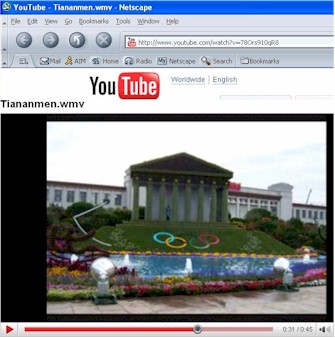 |
One of our Chinese students
created a special video, which he subsequently posted on YouTube to show
screen captures of the difference between Google search results for "Tianamen"
versus Baidu.
Click on the screen capture to see the video |
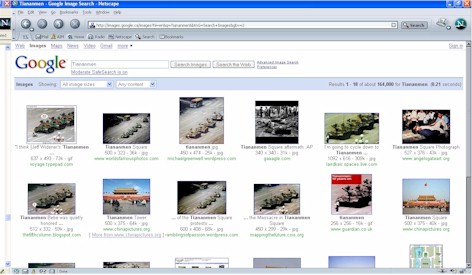 |
Google image search results
for Tiananmen
(2008 Nov) - virtually same results in July 2015 |
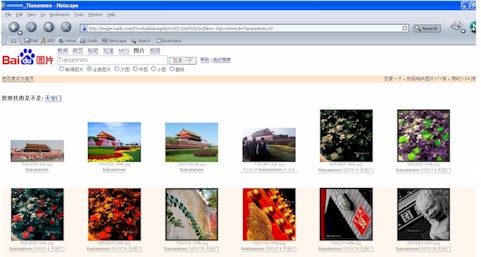 |
Baidu image search results
for Tiananmen
(2008 Nov) - virtually same results in July 2015 |
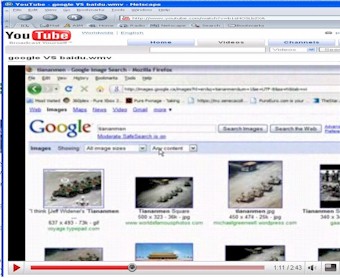 |
Google vs. Baidu
commentary from 5th semester Seneca students in BCS555 Nov 2008. Screen captures and commentary showing the differences between
commentary is in English
and Mandarin
|
|
| What's the difference between
directories versus search engines, ?
read http://www.computerguru.net/learn/NavNet32.htm http://www.computerguru.net is run by Tom Peracchio see www.computerguru.net/Qstguru.htm (still works
in 2013)
"Directories or Index Sites
- Places To Find General Information
Directories or Index style
sites organize information in some kind of structure designed by a human
Keep in mind, just because you don't find what you're looking for at a directory or index site doesn't mean that it doesn't exist. While a directory may be a quick way to find some general information, search engines are more powerful and can help find more specific information. Search Engines - Power tools to find Specific Information Web search engines are actually databases that contain references to thousands of resources. Users are able to interact with the database, submitting queries that "ask" the database if it contains resources that match specific criteria. A web search engine provides an interface between the user and the underlying database. The web search engine runs the search string against the database, returns a list of resources that match the criteria, and displays the results for the user. Each web search engine provides its own database, interface, and special features. In addition, because each search engine collects resources differently, the same query typed into several search engines is likely to produce different results." Questy is Tom Peracchio who said in an email, May 2005, that he'd gladly allow the use of his resources for educational purposes. Copies of emails kept in the permissions binder. |
| The place to
go to see a trustworthy and reliable comparison of the leading search engines
www.notess.com/search thanks to Brian Tang in MGTD06 in Oct 2005 for advising of the updated URL on Notess site
|
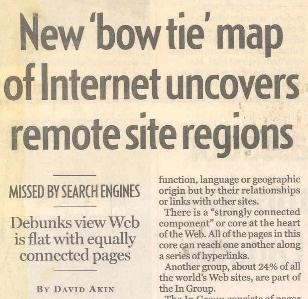 |
Part of understanding Search
Engines - means understanding how the Internet is connected; and more importantly;
how many web pages are connected in a way that would make it difficult
for Search Engines to find them, and index the content there.

This is a good article which helps students to understand more about how the internet has web pages which are not connected together in a regular fashion, but rather disjointed all over the place. |
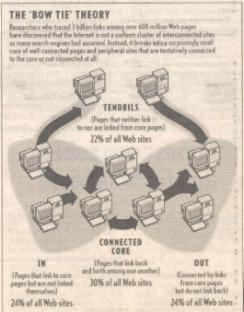 |
Diagram showing
how many web links go off in directions without linking to any other web
pages, so they cannot link back around - and risk being cut off if the
single link going out to them goes dead.
 |
| Mark
Staveley, is a specialist in mobile and wireless internet development as
well as a specialist in search engines.
Staveley suggests looking at these sites for the purpose of understanding how Search Engines can be compared to each other in terms of how they cover the mass of content on the net as well as how they index and list various searches. |
Staveley
recommends looking at
SSSpider™-compatible Search Engine Statistics www.kryltech.com/ssspider/statist/statist.htm 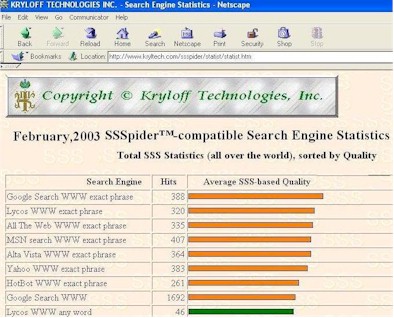
Kryloff Technologies is a joint venture of Sergey Kryloff and PKWARE Inc., the inventors of the Zip data compression format. They were contacted by email in Sept 2005 for permission to link to, and use a screen capture of their site. Sergey Kryloff said "Of course, you may", Copies of emails kept in the permissions binder. |
| Recommended
by Mark Staveley
|
Steve Lawrence
and C. Lee Giles, NEC Research Institute
Search Engine Coverage formerly http://www.neci.nj.nec.com/homepages/lawrence/websize98.html Lawrence and Giles make two
excellent points
|
| Search
Engine Q&A with Tim Richardson
Q. Why would search engines
allow you to submit your website for free?
Q. Is it important to
have a huge list of sites?
"Why is a search engine's database size important? Even with the best relevance ranking technology, search features, and user interface, a search tool cannot find the record that does not exist in its database. With a constantly changing Web that offers new and changed information content daily, the large search engine databases become crucial tools for finding answers to questions beyond the very general and popular content offered by portals.Q. So if people go to your search engine a lot, is that good? A. Yes, because then you can tell potential subscribers to advertising that you have a lot of visitors to your search menu page - which would then convince advertisers it would be worthwhile to buy ad space here since it gets a lot of traffic. |
|
|
CONTACT I MAIN PAGE I NEWS GALLERY I E-BIZ SHORTCUTS I INT'L BIZ SHORTCUTS I MKTG&BUSINESS SHORTCUTS I TEACHING SCHEDULE |
| . | |
| MISTAKES ITEXTS USED I IMAGES I RANK IDISCLAIMER I STUDENT CONTRIBUTORS I FORMER STUDENTS I | |
| . |